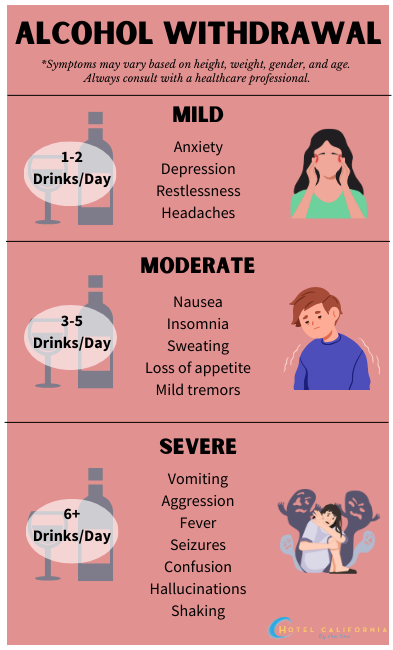Why am I shaking after drinking Alcohol?
Is shaking after drinking alcohol normal? In fact, many people experience shakes or tremors after drinking or when they are hungover from alcohol. The timeline in which a person experiences shakes or tremors will depend on how much alcohol they consumed and other factors such as individual metabolism, the type of alcohol and if they have been consuming alcohol alongside other substances. Alcohol shakes are a common mild symptom of alcohol withdrawal or alcohol-related brain damage. They typically occur when the depressant effects of alcohol wear off and the brain is experiencing overwhelming amounts of activity that it is not used to after being on alcohol for a long period of time.

Alcohol shakes and tremors are often used interchangeably, however, they can have different meanings depending on the cause. Alcohol shakes occur in the limbs when someone has become physically dependent on alcohol. When that person suddenly stops alcohol consumption, they can develop the shakes. Shakes can range from mild to moderate. Tremors tend to be more intense. They usually occur in heavy drinkers at any time when their blood alcohol content level has significantly dropped. Tremors are more pronounced and often begin as shakes. When shakes progress, they can turn into severe tremors if the person is unable to drink.
Morning Shakes
The “morning shakes” are what some people refer to as alcohol shakes. For a person with active alcohol use disorder, the shakes can occur first thing in the morning when their alcohol content level is at its lowest. In addition to low blood alcohol content levels in the body, factors such as low blood sugar from not eating, prolonged caffeine intake from attempting to sober up and high blood pressure from excessive alcohol intake, also contribute to experiencing alcohol shakes.
The common physical response to excessive alcohol intake can also be attributed to how the brain and body react in the absence of alcohol. After a period of time of excessive or binge drinking, when alcohol finally leaves the body, blood alcohol levels drop and can cause involuntary shaking and trembling. Tremors can be mild to moderate and are often accompanied by increased heart rate and other short-lived symptoms.

Why do I shake after drinking alcohol?
Most people experience shaking in their hands and fingers. Some also experience shaking in their arms, eyes, head and even in their voice. During prolonged alcohol use, the brain can develop a disruption in the way in which it sends instructions to muscles and nerves. This disruption in message sending can cause symptoms such as shaking of the arms, hands and fingers.
Another reason why alcohol shakes can occur is due to the brain’s inability to self-regulate as it tries to re-balance itself without the presence of alcohol. During alcohol consumption, it regularly depresses the central nervous system. When alcohol is suddenly removed, the brain is unable to quickly adjust to the high stimulation of activity, because it has become accustomed to long periods of sedation. When the brain is unable to cope, it can send incorrect messages to the nerves leading to shaking in the hands.
Causes of shaking after drinking Alcohol
- Sometimes, alcohol shaking after drinking is a result of changes to the nervous system that contribute to alcohol withdrawal. When the alcohol leaves your body it can also cause imbalance in the sympathetic nervous system. This area of the body is in charge of increasing your heart rate and can produce shakes or tremors.
- Alcohol impacts the body’s ability to monitor low blood sugar, so when it does get low, it can result in shaking, sweating and headaches.
- Alcohol shakes can simply be symptoms of alcohol withdrawal, which occurs after a person who drinks heavily suddenly stops or significantly reduces how much they drink because they have become dependent on the drug.
- Alcohol-related brain damage can be caused in the cerebellum area, where the brain regulates balance and coordination and fine motor skills. When this part of the brain is damaged, it can cause the development of shakes and tremors.
- Other people can develop damage to the peripheral nervous system. This can cause muscle weakness, numbness and tingling in the peripheral neuropathy as well as shakes.
- Alcoholism leads to liver damage and liver disease. Liver disease in advanced stages can lead to the development of flapping hands, liver flap or what is known as asterixis. Asterixis is a condition in which a person develops a flapping tremor when their hands and wrists extend outwards as if someone is pushing against the back of their hands. Liver flap is also a characteristic of the early stages of hepatic encephalopathy.
- Hepatic encephalopathy is a condition in which the liver is unable to efficiently filter out toxins that can harm the brain and body. Toxins such as ammonia and manganese. This causes problems with motor control and you begin to have tremors in the motion of a bird flapping its wings.
- To compensate for the sedative effects of alcohol, sometimes the brain releases more excitatory neurotransmitters, which can increase nerve activity to keep the body in a more wakeful state. This can sometimes lead to shaking and tremors.
Check Your Insurance Coverage for FREE
Find out if your insurance covers addiction treatment in minutes. We accept most insurance!
Alcohol Shakes vs Delirium Tremens
Those who suffer from severe alcohol withdrawal syndrome can develop delirium tremens (DT). DT is a much more severe form of alcohol shakes that can cause hallucinations, and seizures and result in other life-threatening side effects. DT is caused by abrupt cessation of heavy alcohol consumption. In severe cases of alcoholism, DT is unfortunately very common during withdrawal and can be dangerous if not properly managed. Users will experience extreme confusion, severe hallucinations, high fever, seizures and even cardiovascular issues.
Alcohol shakes are considered mild symptoms of alcohol withdrawal. In more serious cases of alcoholism, tremors may occur. In severe alcohol abuse cases, a user can develop symptoms of DT, in which immediate medical care is needed.
How to Stop Alcohol Shakes
- Stay hydrated
- Eat a nutrient-rich diet
- Take vitamins and supplements recommended by medical providers
- Mediation and relaxation help control stress and anxiety which can also contribute to shaking
- Prescription medications such as acamprosate, naltrexone, or disulfiram
- Stop drinking alcohol
- Medical and behavioral treatments such as detox, inpatient treatment and outpatient rehab programs
Reach out to Hotel California by the Sea
We specialize in treating addiction and other co-occurring disorders, such as PTSD. Our Admissions specialists are available to walk you through the best options for treating your addiction.
Treatment for Alcohol Use Disorder
Alcohol shakes generally start out as light shaking of the hands. It can slowly progress into tremors. Shakes and tremors are also usually accompanied by other side effects such as anxiety, mood swings, depression, clammy skin, increased heart rate, insomnia, nausea and vomiting. The shakes occur when someone who drinks suddenly stops drinking and the brain continues to function as though alcohol is still present in the system. The brain and body are unable to cope with the drastic change and this leads to shaking and trembling. They can occur as soon as six hours after the last drink. In severe cases of alcohol use disorder, some people can develop alcohol shakes and tremors while they are drinking.
Alcohol use disorder can be successfully treated through professional behavioral health treatment programs such as Hotel California by the Sea. We offer all levels of care including alcohol detox, residential treatment, partial hospitalization program and intensive outpatient program. We utilize evidence-based treatment methods such as CBT, DBT and EMDR therapy. Hotel California by the Sea is dedicated to providing the support, tools and resources clients need to help them overcome their alcohol addiction.
References:
https://www.healthline.com/health/alcohol/hangover-shakes
https://www.drugrehab.com/addiction/alcohol/effects-of-alcohol/shakes
https://www.medicalnewstoday.com/articles/alcohol-shakes
https://zinniahealth.com/substance-use/alcohol/shaky-hands
https://www.bicyclehealth.com/blog/alcohol-shakes-tremors
